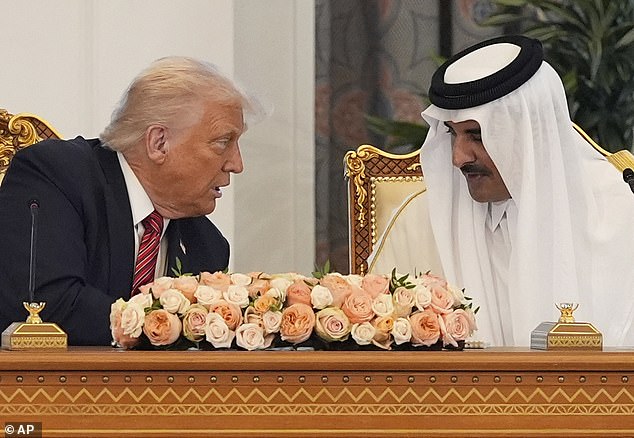President Trump’s trip to the Arabian Gulf is a curious mixture of commercial deals, diplomacy and promotion of family interests.
Dollar bills have been written all over it, with $600billion of orders from Saudi Arabia and more billions to be added in Qatar and the UAE.
The immediate biggest beneficiaries are investors in AI chip leader Nvidia. A deal with Saudi start-up Humain saw Nvidia stock rocket, valuing the company at more than $3trillion.
The rapprochement with Riyadh and for that matter the whole Gulf region will be tracked closely in London.
Trump’s success with the ‘Abraham Accords’ in his first term, when Dubai and other Gulf entities signed peace and business deals with Israel, has not blunted his ambition.
Despite disruption from Israel’s battle with Hamas in Gaza, the White House believes it can eventually bring the modernising Saudi leader Mohammed bin Salman within the tent.

Middle East tour: President Donald Trump shakes hands with Qatar’s Emir Sheikh Tamim bin Hamad Al Thani in Doha
Britain has been the Western democracy closest to Saudi Arabia, supported by royal visits. BAE Systems has been operating in the region for 60 years.
It employs 7,000 people on the ground, now mainly local, charged with keeping UK-made Typhoons and Tornado fighter jets in the air. Plans for further, more advanced fighter sales are in abeyance.
America is making defence inroads with the sale of air-to-air missiles and precision-guided weapons. In the past the UK has been a dominant defence supplier to Gulf states fearful of being seen as compromised by closeness to the US.
Qatar is seeking a deal for F-15 fighters and the UAE hopes Trump will reverse a decision by Joe Biden to halt the sale of F-35s, components of which are made in the UK.
Trump’s tilt to the region is a shot across the bows. It ought to be a signal to Keir Starmer, Foreign Secretary David Lammy and Labour that Britain needs to intensify its defence diplomacy in the Middle East or influence, exports and jobs are at risk.
Smoke signal
Imperial Brands is generally shunned by UK investors fearful of involvement in the nicotine industry.
Yet the tobacco group, known for its Winston and Gauloises brands, has proved a terrific investment since German chief executive Stefan Bomhard took the helm.
His unexpected departure, at the end of the year, brought shares down with a bump. Under him, market share has risen in key markets, despite price increases.
There have been improved returns for ‘next generation’ products – vapes and heated tobacco.
Some £9.8billion has been returned to shareholders and market value is up from £14.4billion to £22billion.
Bomhard is seeking the quieter life after leading Inchcape and Imperial, having been mentioned as a potential chief executive for Reckitt or Unilever.
Instead, he is opting for small town life in Bavaria. He will be succeeded by finance chief Lukas Paravicini.
Change at the top is often welcomed. At Imps it foments anxiety.
Premium shadow
Aviva’s all-British £3.7billion takeover of motor insurer Direct Line has caught the eye of the Competition and Markets Authority (CMA). The reference is not likely to cause sleepless night for chief executive Amanda Blanc.
Together, the motor share of the merged company, at around 20 per cent, will still be smaller than rival Admiral.
Generally, the CMA doesn’t ask for structural changes unless a 25 per cent threshold is reached.
Car insurance is highly competitive, with 17 firms on the most-used price comparison sites. Nevertheless, a market powered by two behemoths would make it easier to drive surging premiums higher.
Comeback kids
Former GSK boss Andrew Witty is making an unrehearsed exit from America’s medical giant United Health.
His departure comes amid turmoil as it grapples with government investigations, surging medical costs and the public reaction to the murder of the boss of insurance offshoot Brian Thompson in Manhattan.
Former chief Stephen Hemsley takes back the reins in what is becoming a Wall Street habit following in the steps of Starbucks, Walt Disney and P&G.
DIY INVESTING PLATFORMS

AJ Bell

AJ Bell
Easy investing and ready-made portfolios

Hargreaves Lansdown

Hargreaves Lansdown
Free fund dealing and investment ideas

interactive investor

interactive investor
Flat-fee investing from £4.99 per month

InvestEngine

InvestEngine
Account and trading fee-free ETF investing

Trading 212

Trading 212
Free share dealing and no account fee
Affiliate links: If you take out a product This is Money may earn a commission. These deals are chosen by our editorial team, as we think they are worth highlighting. This does not affect our editorial independence.
